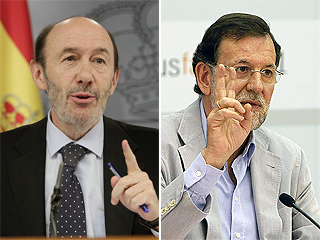On November 20, the fate of another European leader will be sealed by the ongoing economic crisis. Barring a major surprise, Spain will vote in conservative Mariano Rajoy as its new prime minister, to replace José Luis Rodríguez Zapatero.

Zapatero is not running for reelection a second time, instead his Socialist colleague Alfredo Pérez Rubalcaba is the government-backed candidate. But when Zapatero announced earlier this year that he would be stepping aside, there was no doubt that it was the economy that had cut his career short, in the same way it has ended the administrations of Georgios Papandreou of Greece and Italy’s Silvio Berlusconi.
With Spain once again exposed to market uncertainty due in great part to its lack of growth, high unemployment rate and unruly deficit, the general election introduces an element of predictability to the country’s current turmoil. With a double-digit poll lead, Rajoy’s Popular Party (PP) is expected to stroll to victory; the only mystery is whether he will secure a parliamentary majority.
Rajoy is a veteran of general elections, having twice lost to Zapatero, in 2004 and 2008. The first loss was attributed mainly to freak circumstances following the Madrid train bombings and anger at the Aznar government’s insistence on erroneously blaming the attack on ETA. The second defeat was due in great part to Rajoy’s lack of moderation during a campaign in which he scared many voters.
But since 2008, he has made a conscious move away from the hard right and avoided, for much of that time, putting himself forward too prominently as a potential prime minister. In keeping his head down, Rajoy has prevented his own lack of charisma from tainting his party’s chances. Instead, he has allowed the Zapatero government to prepare its own thumping electoral disaster through its mismanagement of Spain’s economy in the face of the eurozone crisis, while himself remaining studiously vague.
With Rajoy’s party in such a commanding position for much of the last two years and with a stern economic challenge ahead of him, anything less than a PP majority on Sunday would constitute a failure every bit as significant as his 2004 and 2008 losses.
A turbulent year
This has been perhaps Spain’s most economically and politically turbulent year since the democratic transition three decades ago, with an angry response to crisis-inspired economic austerity, the emergence of a new protest movement and the governing Socialists on an unstoppable slide. In May, Zapatero’s party suffered a record defeat in local elections. November 20 will complete the transformation of the country’s political map, placing Spain well and truly in the hands of the still enigmatic Rajoy.
With the next prime minister not expected to be instated until mid-December, Spain needs to project an image of political cohesion in order to weather the eurozone storm. And while he has comfortably sauntered through a dull, uninspiring campaign, the weeks immediately following his anticipated victory will be infinitely more demanding for Rajoy. They will also be crucial ones for the country.
Leave a Reply
You must be logged in to post a comment.